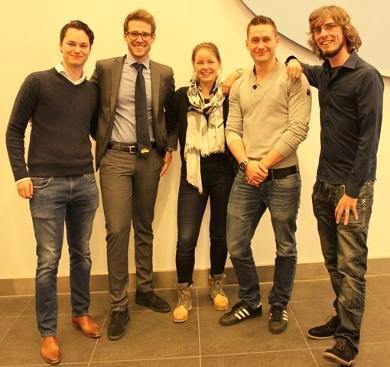
Predictive policing wins group presentation in CSM elective Governance of crime and social disorder
If you know a crime is about to occur, should you be able to prevent it before it has even happened? This was one of the questions that was posed in light of predictive policing as a form of mass surveillance during the debate in the elective Governance of Crime and Social Disorder class of the Crisis and Security Management Master.
For several years now the last session of the CSM elective ‘governance of crime and social disorder’ (Teacher Dr. Elke Devroe) is devoted to group presentations on actual themes of late modern governance. In this final session of the course, the classroom is transformed into a live television show where students apply their insight into contemporary security issues in a role-lay and a lively debate. Statements are launched and students vote with green and red cards to show their opinion. This year’s batch has been excellent in presenting insightful arguments on sensitive issues within security governance like stop-frisk and search police practices and sex notification Acts in the US and the UK. But after the final vote has been cast, the group with the topic ‘predictive policing within the broader theme of mass surveillance’ came out on top. This has broken a 2 year streak of the topic of mass surveillance holding the leading place. Predictive policing is the new way of governance; more specific in the US.
Mass surveillance is almost a given in this day and age. Big companies track your data both online and offline. In Stratumseind for example, police works together with private security companies, big data analyzers and many other partners to automate mass surveillance using cameras, audio sensors and even temperature in such a way that it can predict crime and social disorder. Because if you know a crime is about to occur, are you not forced to prevent it before it has even happened?

Philip van Klompenburg: Police Officer
Francesc Gaia Mesquida: All-seeing Security Guard
Tessa Oomen: Victim
Kenrick Boerebach:Potential Offender
Tom Stoot: Police Officer
To illustrate the issue of infringing on privacy rights in the use of mass surveillance, students set up three different scenes where pickpocketing was monitored and acted on by the police and private security companies. We then went on with the debate with the question if we should pursue ‘predictive policing’. This touches on many aspects of our life: Is the world so determined that we can predict everything? Is giving up our privacy worth the extra security? What do we do with the excess of data available, or more importantly: what do all those companies do with our data without us knowing about it? The security guard monitoring our every step works his way up to be the new overlord of our lives, but should we accept his rule?
